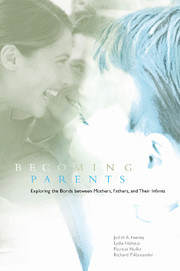Book contents
- Frontmatter
- Contents
- Preface
- 1 The Transition to Parenthood
- 2 Attachment in Childhood and Beyond
- 3 The Study
- 4 The Couples
- 5 Pregnancy and Plans for Birth
- 6 Couples' Experiences of Birth and New Parenthood
- 7 How Does New Parenthood Affect Couples?
- 8 Dealing with Depression
- 9 Men, Women, and Household Work: The Diaries
- 10 Couples' Changing Attachment Relationships
- 11 Six Months into Parenting
- 12 New Parenthood in Perspective
- Appendix A Core Questionnaires Completed by Couples
- Appendix B Summary of Sample Characteristics
- Appendix C Summary of Major Statistical Analyses
- References
- Author Index
- Subject Index
9 - Men, Women, and Household Work: The Diaries
Published online by Cambridge University Press: 05 June 2012
- Frontmatter
- Contents
- Preface
- 1 The Transition to Parenthood
- 2 Attachment in Childhood and Beyond
- 3 The Study
- 4 The Couples
- 5 Pregnancy and Plans for Birth
- 6 Couples' Experiences of Birth and New Parenthood
- 7 How Does New Parenthood Affect Couples?
- 8 Dealing with Depression
- 9 Men, Women, and Household Work: The Diaries
- 10 Couples' Changing Attachment Relationships
- 11 Six Months into Parenting
- 12 New Parenthood in Perspective
- Appendix A Core Questionnaires Completed by Couples
- Appendix B Summary of Sample Characteristics
- Appendix C Summary of Major Statistical Analyses
- References
- Author Index
- Subject Index
Summary
“The worst thing is the sharing, or rather the nonsharing, of the responsibilities – like getting up in the night and doing things like that.”
One of the most consistent findings from studies of new parenthood concerns the importance of the allocation and performance of household tasks. As we discussed in Chapter 1, new parents often report that they had not fully anticipated the amount of work involved in parenthood, or the difficulty they would experience in maintaining equitable and nontraditional patterns of domestic work.
Similarly, when couples in the transition group were asked about the “worst part” of parenting (see Chapter 6), several spouses raised issues concerning the division of household labor. These issues often centred on the different expectations and roles of husbands and wives. For example, one new father noted that the reality of parenthood had come as quite a shock to him, because he had expected to be greeted by a clean and organized household when he came home from work at the end of each day:
I used to spend every holiday at my cousins' farm, and I suppose it gave me this false impression – that I would go out to work, come home, and everything would be spotless; there'd be food on the table waiting for me, and all that type of thing. So the first week after the baby was born, I used to get really angry, because nothing would have been done.
- Type
- Chapter
- Information
- Becoming ParentsExploring the Bonds between Mothers, Fathers, and their Infants, pp. 145 - 162Publisher: Cambridge University PressPrint publication year: 2001

